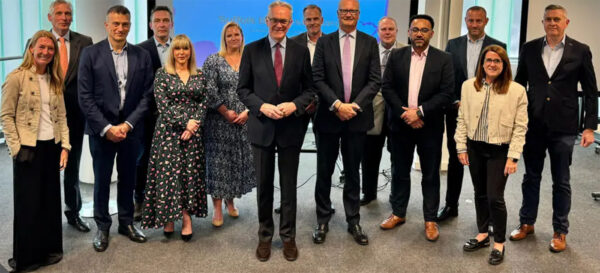
The Future of Freight will be Green
Serious green ambitions are being shared by UK-wide shipping logistics providers. No longer are such thoughts firmly fixed on the peripherals of the industry; they’re increasingly becoming part of long-term commercial strategies.
Right now, there are numerous projects underway that propose new, greener ways of freight delivery in the UK.
But it doesn’t stop there.
There’s the Sustainable Shipping Initiative (SSI). This multi-stakeholder collective of ambitious and like-minded leaders is intent on driving change through cross-sectoral collaboration.
And this is just one initiative. The UK is spearheading an entire sustainable shipping sector, with a clear roadmap of performance and reporting driven by the need for rapid decarbonization by 2050.
This is aptly highlighted by the Freight Innovation Fund (FIF). Launched in January 2023, the FIF will help SMEs develop greener, more efficient freight solutions. Funded by the Department for Transport (DfT) and delivered by Connected Places Catapult, the programme will identify and trial innovative new products and services.
Navigating the future
Let’s get something out of the way upfront: there is no immediate need to reinvent how the shipping sector operates. But evolution is needed. Something that is highlighted in the Roadmap to a Sustainable Shipping Industry, which defines tangible milestones for the UK to achieve in the coming years,
The Roadmap to a Sustainable Shipping Industry is a call to action. An opportunity for operators to make a positive impact across the industry and wider supply chains in the decades to come.
‘Tangible Milestones that Can Be Achieved in the Coming Decades’
If there’s one takeaway from the Roadmap to a Sustainable Shipping Industry, it’s that the practical guidance offered to stakeholders across the supply chain is invalid. Organisations can develop sustainable strategies through a holistic approach, with tangible milestones able to be achieved in the coming decades.
The roadmap is a mechanism for the industry to measure performance through regular progress reviews, even as the industry evolves. What does this look like in a practical sense? Let’s examine the key sustainability performance indicators:
- Ocean governance: to promote a healthy use of marine resources while promoting sustainable solutions
- Communities: to be a trusted and responsible partner with communities where people live, work, and operate
- People: to provide a healthy, safe, and secure work environment so that people can enjoy productive, rewarding careers and achieve their full potential.
- Transparency: to drive performance improvements and enable better, more sustainable decision-making through transparency and accountability
- Finance: to develop financial solutions that reward performance and enable large-scale innovation, technology, design, and operational efficiencies
- Energy: to use only a diverse range of carbon energy sources, using all resources efficiently and responsibly to achieve zero emission shipping, and avoiding all negative environmental and bio-diverse impacts.
Of course, sustainable shipping is nothing new. There are numerous parallel schemes designed to bolster sustainable solutions. For instance, in 2018, the Initial International Maritime Organisation (IMO) laid out key ambitions to significantly reduce GHG emissions by 2050. The main goals of the policy are:
- To cut annual greenhouse gas emissions from international shipping by at least 50% compared to 2008 and strive to eliminate GHG emissions entirely by the end of the century.
- The initial GHG strategy targets a reduction in CO2 emissions of at least 40% by 2030, hopefully reaching the ambitious target of 70% by 2050.
Simply put, the future of freight will be green.
A new round of government funding totalling £1.2 million has been earmarked for nine separate projects for cleaner, more innovative ways of delivering freight around the UK. Don’t forget, this is just one round of funding. There’s more investment to come, with a government investment totalling £7 million.
Nine SMEs have been chosen to help promote sustainable operations across the sector. The innovations, which ensure resilience, inefficiency, and carbon reduction, are distributed through the Connected Places Catapult First Accelerator programme as part of the Freight Innovation Fund.
Interested in learning about which SMEs were cherry-picked as part of the first round of FIF funding and are destined to transform the future of freight? Keep reading below:
Skyports Drone Services
Based in Orkney, Scotland, Skyports Drone Services uses autonomous drones to deliver goods and capture business-critical data across hard-to-reach places.
A project partnered with Royal Mail and Loganair will see Skyports receive £150,000 to create an intermodal transport hub to improve island-to-island connectivity and drone performance and reliability when making deliveries and conducting surveys and monitoring.
CurbCargo
Based in London, this smart delivery booking management platform improves loading bay and curbside utilisation, reducing congestion and pollution.
In a project partnered with Savills, CurbCargo will be awarded £120,000 to leverage data to track the environmental impact of freight deliveries. This will prompt companies to change how they order products and reduce light vehicle movements.
Lightricity
Based in Oxford, Lightricity is a calibrated apparatus that tests the solar cell performance (luminosity, current voltage, and power voltage) of white LED lights from different manufacturers.
Partnered with Bradford Swissport Ltd., Lightricity’s unique, patented technology has been promised £119,000 to harness energy from indoor, low-level light sources and power battery-free tracking devices. It is hoped that this will show companies the benefits of tracking devices without the cost challenges of battery changes and sustainability impacts.
Electric Assisted Vehicles Limited (EAV)
Based in Bicester, Oxfordshire, Electric Assisted Vehicles Ltd. is developing a 4-wheel electric-assisted lightweight delivery vehicle as an alternative to diesel and gasoline cars.
Alongside FedEx Express, EAV currently provides vehicles to DPD, Asada, Ocado, and Zoom, amongst other brands, and is looking to use the £150,000 to continue to scale operations, expanding into other sectors like logistics, facility maintenance, and waste management in the coming years.
Otaski Energy Solutions Ltd. and Syselek Ltd
Based in Gateshead and Warwick, respectively, Otaski Energy Solutions and Syselek are both on the cutting edge of green technology development.
Otaski is currently trialling their cost- and energy-efficient smart EV charger and bi-directional convertor, which enable EVs to charge from any power grid source. This innovation alone could help create an intelligent fleet charging system that increases grid reliability, resilience, stability, and adaptation to variable loads.
Syselek focuses on electrifying HGVs to help support the decarbonization of UK roads, transitioning some or all of their customers’ fleets to help minimise CO2 emissions. Having been gifted £145,000, it’s clear that the UK Government is keen to support EV operations and infrastructure.
CocoonFMS Ltd
Based in Lichfield, Staffordshire, CocoonFMS provides cloud-based, industry-leading software for logistics and freight forwarders, specifically tailored to business needs.
From TMS (transport management systems) to demurrage and detention calculators, CocoonFMS focuses on helping businesses streamline supply chains and improve customer satisfaction. With its digital calculator to automate port cost management, shipping expenses, and more accurate user invoice information, planning can be honed, and delays avoided.
A capital injection of £129,000 and a partnership with Simarco Worldwide Logistics will allow CocoonFMS to further proliferate its software solutions across the sector, improving supply chain performance and reducing sector-wide excess carbon.
Entophy
Based in Suffolk, Entophy has partnered with Fujitsu Services UK and Atamai Freight to create a digital twin of shipments to track them during delivery, providing vital information and supporting the greater use of digital products in the freight sector.
Like Otaski Energy Solutions and Syselek, Entophy has been allocated £145,000 to help support operational development.
RoboK Limited
Based in Cambridge, RoboK generates AI-powered insights to create safer, high-performance industrial workplaces. Leveraging AI, RoboK leverages AI to analyse existing video data, such as CCTV, reviewing spatial capacity and asset movement in real-time. This reduces inefficiencies and costly delays.
A government cash injection of £133,000 will allow RoboK to continue its established relationship with some of the UK’s largest critical infrastructure operators, turning on-site visual data into high-value, actionable insights.
Estudio Cactus
Based in London and working in collaboration with Portsmouth International Port, Estudio Cactus aims to create a safer, more secure freight supply chain and port logistics operations.
The UK Government has handed Estudio Cactus £100,000 while they trial the use of their health and safety, security, and environmental software, which, once fully operational, will help Portsmouth International Port increase efficiency through improved resource management.
The future of freight is green
The government’s commitment to spending £1.2 million on sustainability in a single round of investment is clear evidence that freight operations are evolving and will continue to evolve as the decades unfold.
Such investment will create a whole raft of new vocations and vacancies; new skills can be developed; and value can be added to businesses. And this is true across the whole range of sustainable innovations.
Take Skyports drone services. Drone pilots will be needed to carry goods. Flight operations, maybe area managers, will be needed to coordinate deliveries. What about drone maintenance, customer service, and business development executives? To operate with finesse, business services need an infrastructure of knowledgeable, experienced people.
And that’s just one business.
The future of freight is green. But it’s also bright. Exciting. Full of vocational possibilities. A recruiter with one eye on the future will be able to source candidates that organisations need to optimise operations for what’s to come.
A recruiter like LME.
Sources:






